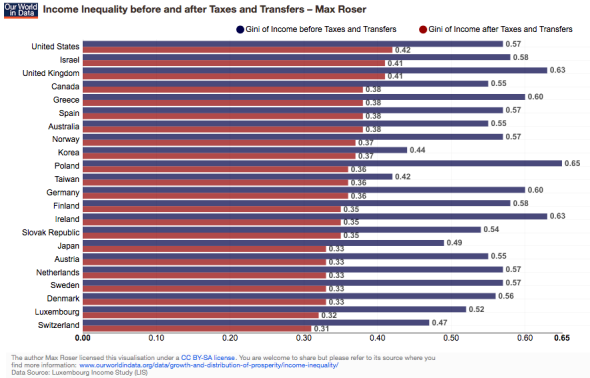You’ll often hear that income inequality is far more severe in the United States than most of the developed world. But is that because our economy is naturally tilted in favor of the rich? Or is it because our government does less to redistribute resources?
This graph, from University of Oxford economist Max Roser’s Our World in Data project, offers one elegantly illustrated answer to that question. When it comes to market earnings, shown in blue, U.S. inequality—measured by the Gini coefficient—isn’t much worse than it is in the Netherlands or Sweden. It’s slightly less severe than in Germany or the United Kingdom. But in Europe, governments are more aggressive about addressing the income gap, as you can see in red. As a result, inequality is less pronounced in those countries after taxes and benefit programs are taken into account.

It might seem strange to think that market incomes in famously egalitarian Sweden or Finland are just as unequal as in the U.S. (if not moreso). And by some measures, they’re not. The Gini coefficient is supposed to be a holistic measure that captures how concentrated income is through the whole economy. But it misses a lot of very important details. The top 1 percent consumes a greater share of income in the U.S., for instance, than in any other developed country, according to the World Top Incomes Database.
Still, comparisons like Roser’s are useful. You’ll sometimes see writers attempt to explain away, or minimize the importance, of inequality by pointing out that it is growing more slowly and is less yawning once taxes and transfers are taken into account. That may be true. But the graph up above is a reminder that we could be doing much, much more.
